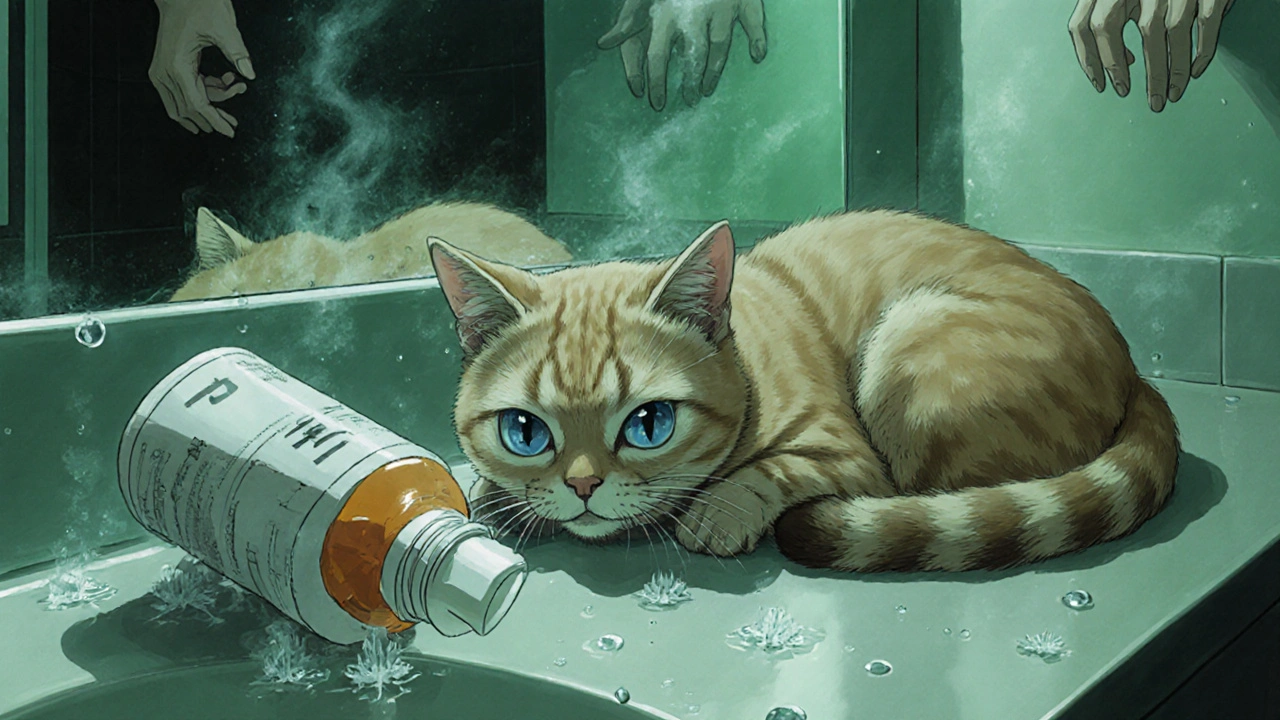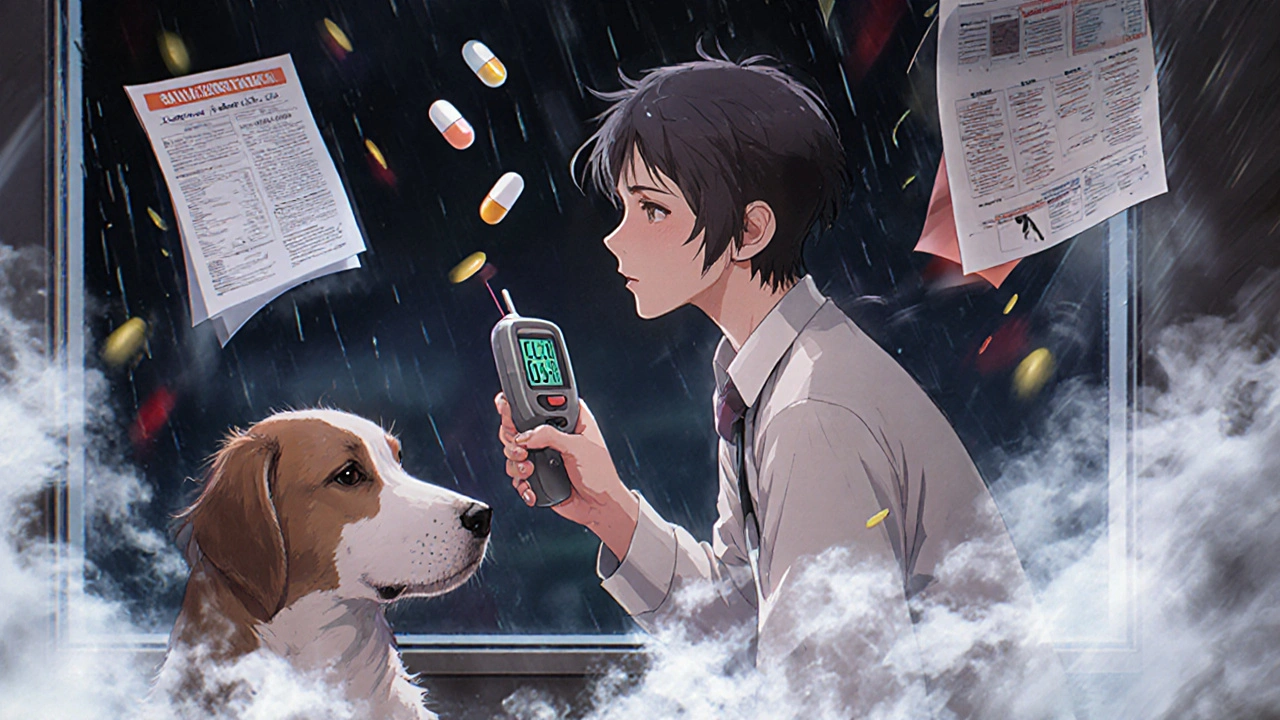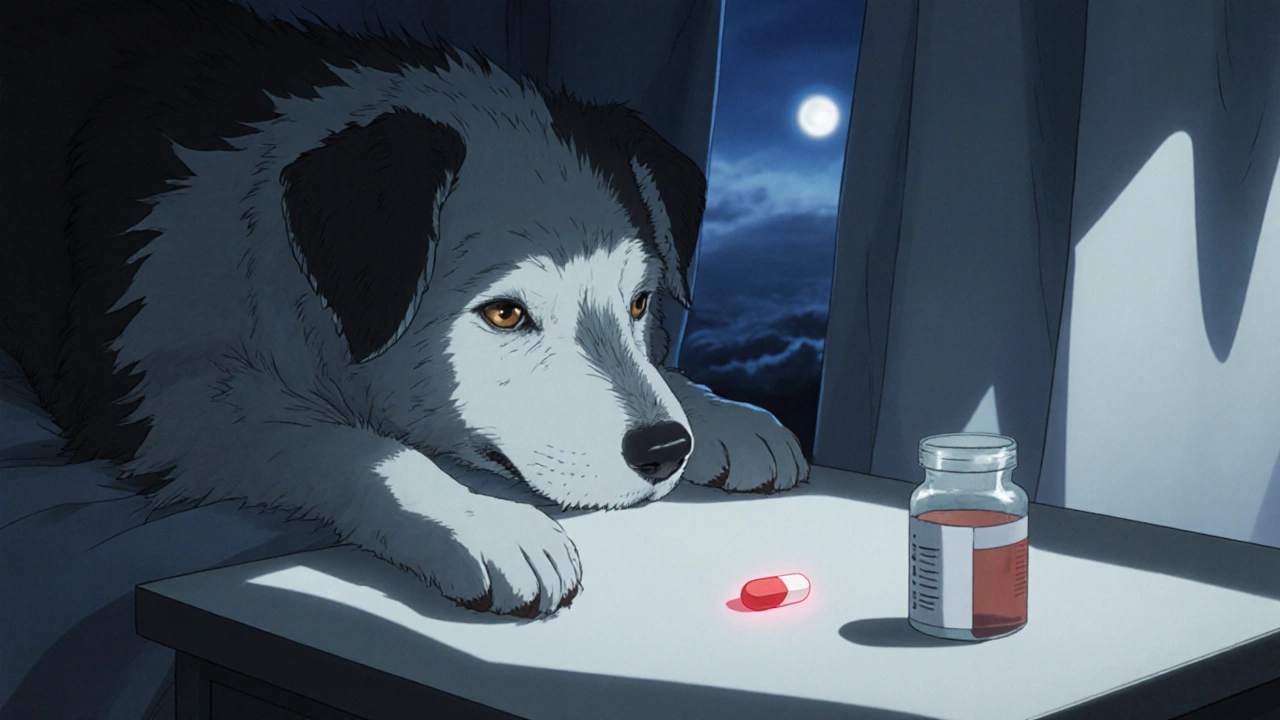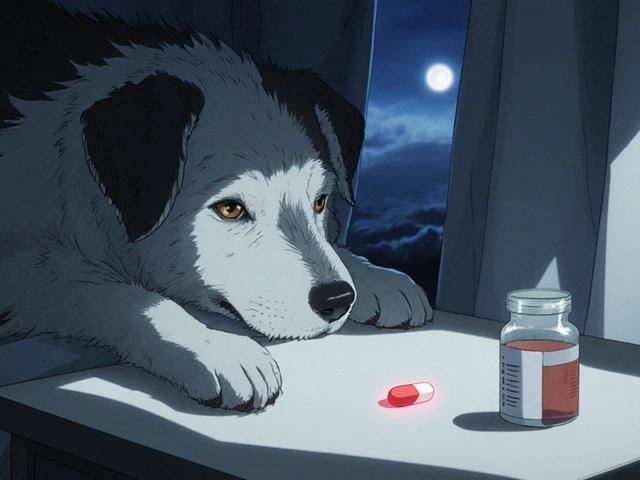Every year, over 150,000 pets in the U.S. end up in emergency vet clinics because they ate something they shouldn’t have-and most of it wasn’t chocolate or trash. It was your medication. A single pill left on the nightstand, a dropped capsule near the couch, or an open bottle on the bathroom counter can turn into a life-or-death situation for your dog or cat. Human medications are the leading cause of pet poisonings, and the symptoms can be subtle, confusing, or mistaken for something else entirely. If you don’t recognize them fast, your pet could suffer organ failure, seizures, or worse. But here’s the good news: if you know what to look for, you can act before it’s too late.
What Happens When Pets Eat Human Medications?
Pets don’t process drugs the same way humans do. Their bodies lack the enzymes needed to break down many common medications, so even tiny amounts can be deadly. Dogs are more likely to eat pills out of curiosity, making up 85% of cases. Cats, though less likely to chew on things, are far more sensitive to certain drugs because their livers can’t process them at all. A single tablet of acetaminophen can kill a cat. One Adderall capsule can send a dog into cardiac arrest. The most dangerous medications fall into four main categories: antidepressants, ADHD stimulants, NSAIDs (like ibuprofen), and acetaminophen. Each triggers a different set of symptoms-and each has its own timeline. Knowing which drug was taken helps narrow down what to watch for, but even without knowing exactly what was eaten, recognizing the signs early saves lives.Antidepressants: Serotonin Syndrome and Paradoxical Reactions
Antidepressants like Prozac, Lexapro, and Effexor are among the most common culprits. When dogs or cats ingest these, their nervous systems go into overdrive. In dogs, this often shows up as agitation, pacing, panting, or vocalizing loudly-symptoms that many owners mistake for anxiety or excitement. But it’s not just behavioral. High body temperature (103-106°F), tremors, rapid heart rate, and dilated pupils are red flags. If left untreated, 78% of these cases progress to seizures. Cats are especially vulnerable to Effexor. Just one extended-release capsule can cause severe liver damage. Signs include excessive meowing, stumbling, vomiting, and yellowing of the gums or eyes. In one documented case, a cat ate a whole bottle because the pills had a sweet coating. The owner thought the cat was just being “noisy.” By the time they got to the vet, the cat’s liver enzymes were over 1,200 U/L-normal is under 100. The twist? Benzodiazepines like Xanax and Ambien often cause the opposite of what you’d expect. Instead of calming your pet, they trigger agitation. In over half of dog cases, these drugs make pets hyperactive, aggressive, or disoriented. That’s not bad behavior-it’s a medical emergency.ADHD Medications: The Silent Killer
Adderall, Concerta, and Ritalin are stimulants designed to keep humans focused. For pets, they’re like a lightning bolt to the heart. Symptoms hit fast-within 15 to 60 minutes. Heart rates can spike past 220 beats per minute (a normal dog’s heart beats 60-140 times per minute). Body temperature soars to 107°F. Tremors become violent. Eyes may appear fixed and dilated. One owner reported her dog ate an Adderall pill and started shaking, pacing, and drooling. She thought he was having a seizure from epilepsy. He wasn’t. He was overdosing on amphetamine. By the time she got him to the vet, his temperature was 105.6°F. He survived-but only because she acted within 90 minutes. The key here is speed. The faster you get treatment, the better the chance of survival. Activated charcoal can help if given within the first two hours. Beyond that, it’s about managing heart rate, cooling the body, and preventing seizures.NSAIDs: Ibuprofen and Naproxen Are Silent Organ Destroyers
You might think giving your dog a baby aspirin for joint pain is harmless. It’s not. NSAIDs like ibuprofen (Advil), naproxen (Aleve), and even aspirin can cause stomach ulcers, kidney failure, and death in pets. Dogs are more tolerant than cats, but still, a single 200mg tablet can be toxic. Symptoms start with vomiting-92% of cases involve it. Then comes black, tarry stools (a sign of internal bleeding). Lethargy follows. By 24 to 72 hours, kidney damage kicks in. Blood tests will show BUN levels above 120 mg/dL-normal is 10-25. At that point, dialysis may be the only option. Cats? They’re even more fragile. A dose as low as 5mg/kg can cause kidney failure. Many owners don’t realize how dangerous these pills are because they’re sold over the counter. But they’re not safe for pets-ever.
Acetaminophen: A Death Sentence for Cats, a Slow Burn for Dogs
Tylenol is the most dangerous drug for cats. Just one 500mg tablet can kill a 10-pound cat. Their bodies can’t process it properly, so instead of breaking it down, their blood turns brown. Mucous membranes (gums, inside of eyelids) become grayish-brown or blue. Breathing becomes labored. This is methemoglobinemia-oxygen can’t reach their tissues. Dogs handle acetaminophen better, but only up to a point. Above 150mg/kg, liver damage begins. Within 24 to 72 hours, ALT liver enzymes skyrocket past 1,000 U/L. Jaundice, vomiting, swelling, and collapse follow. The tragic part? Many owners don’t know the difference. They see a cat acting lethargic and assume it’s just a cold. But if the gums are brown, it’s not a cold-it’s poisoning. One case from February 2023 involved a cat misdiagnosed for 18 hours as having a respiratory infection. By then, methemoglobin levels were over 50%. Survival rate drops to 12% above 40%.What to Do If You Suspect an Overdose
Time is everything. The sooner you act, the better your pet’s chances. Here’s what to do in the first five minutes:- Check for evidence. Look for pill fragments, empty bottles, or scattered capsules. Even a single pill missing from the bottle is a clue.
- Check your pet’s temperature. Use a rectal thermometer. If it’s above 103.5°F, it’s likely a stimulant or antidepressant overdose.
- Look at the gums. Are they pink? Normal. Brown or blue? That’s acetaminophen poisoning.
- Check the pupils. Dilated pupils in a dog with tremors and high heart rate? Likely ADHD medication.
- Call immediately. Don’t wait for symptoms to worsen. Call the Pet Poison Helpline (1-800-213-6680) or the ASPCA Animal Poison Control Center. Both offer 24/7 support with an average response time under a minute.
What You Shouldn’t Do
Don’t wait to see if your pet “gets better.” Don’t try to induce vomiting without professional guidance-some drugs make vomiting more dangerous. Don’t give activated charcoal unless instructed. Don’t assume your pet is fine because they’re still walking. Many pets appear normal for hours before collapsing. And never, ever assume your pet is immune because they’ve eaten something before and were fine. Toxicity depends on weight, age, health, and the exact dose. One time doesn’t mean it’s safe next time.
How to Prevent This From Happening
Prevention is the only surefire way to avoid this nightmare. Here’s how:- Keep all medications in locked cabinets-not on counters or bedside tables.
- Don’t leave pills in purses, pockets, or bags your pet can reach.
- Use child-proof containers, even if you think your pet can’t open them.
- Never give human meds to your pet without vet approval-even if it’s “just a little.”
- Ask your vet about pet-safe alternatives for pain, anxiety, or inflammation.
What’s Changing in Pet Toxicity Prevention
The veterinary world is catching up. The American College of Veterinary Emergency and Critical Care launched an AI-powered app in July 2023 that helps owners identify symptoms in real time. It’s 89% accurate in testing. The ASPCA is rolling out species-specific symptom checkers for cats and dogs in 2024. Banfield Pet Hospital now trains all 1,022 of its clinics on medication toxicity recognition-cutting misdiagnoses by two-thirds. But technology isn’t enough. You need to know the signs. You need to act fast. And you need to treat every pill your pet touches like a potential threat.Final Thought: Your Awareness Is Their Lifeline
Over 89% of pet owners who’ve been through this say they wish they’d known more. They didn’t think their pet would eat a pill. They didn’t realize cats were so sensitive. They thought vomiting was just a stomach bug. But the truth is, pets don’t understand what pills are. They smell, taste, and chew. And if they swallow something dangerous, you’re their only hope. Knowing the signs isn’t just helpful-it’s essential. It’s the difference between a full recovery and a funeral. Between a vet bill of $500 and $5,000. Between life and death. Don’t wait until it’s too late. Learn the symptoms. Secure your meds. Know what to do.What are the most common human medications that poison pets?
The top four are NSAIDs (like ibuprofen and naproxen), antidepressants (SSRIs like Prozac and SNRIs like Effexor), ADHD medications (Adderall, Ritalin), and acetaminophen (Tylenol). NSAIDs cause the most cases overall, but antidepressants and ADHD drugs are the most likely to cause rapid, life-threatening symptoms.
Can a single pill kill my pet?
Yes. A single 37.5mg Effexor capsule can be fatal to a cat. One Adderall pill can trigger cardiac arrest in a small dog. Even one 500mg acetaminophen tablet can kill a cat. Toxicity depends on weight and species, but many human medications are deadly at doses far below what a human would take.
My dog ate a pill but seems fine. Should I still worry?
Yes. Many medications don’t cause symptoms for hours. NSAIDs may take 12-72 hours to damage kidneys. Acetaminophen can take 24 hours to show liver damage. Even if your pet seems normal, call a vet or poison control center immediately. Waiting can cost your pet their life.
How do I know if my cat has acetaminophen poisoning?
Look for brown or blue gums, rapid breathing, swelling in the face or paws, vomiting, and lethargy. Cats develop methemoglobinemia, which turns their blood brown and stops oxygen from reaching tissues. This happens within 1-4 hours of ingestion. If you see brown gums, treat it as an emergency-do not wait.
What should I do if I can’t reach a vet right away?
Call the Pet Poison Helpline at 1-800-213-6680 or the ASPCA Animal Poison Control Center. Both are staffed 24/7 by veterinary toxicologists who can guide you through immediate steps. They’ll tell you whether to induce vomiting, what symptoms to monitor, and whether to rush to an emergency clinic. Don’t waste time searching online-call them.

